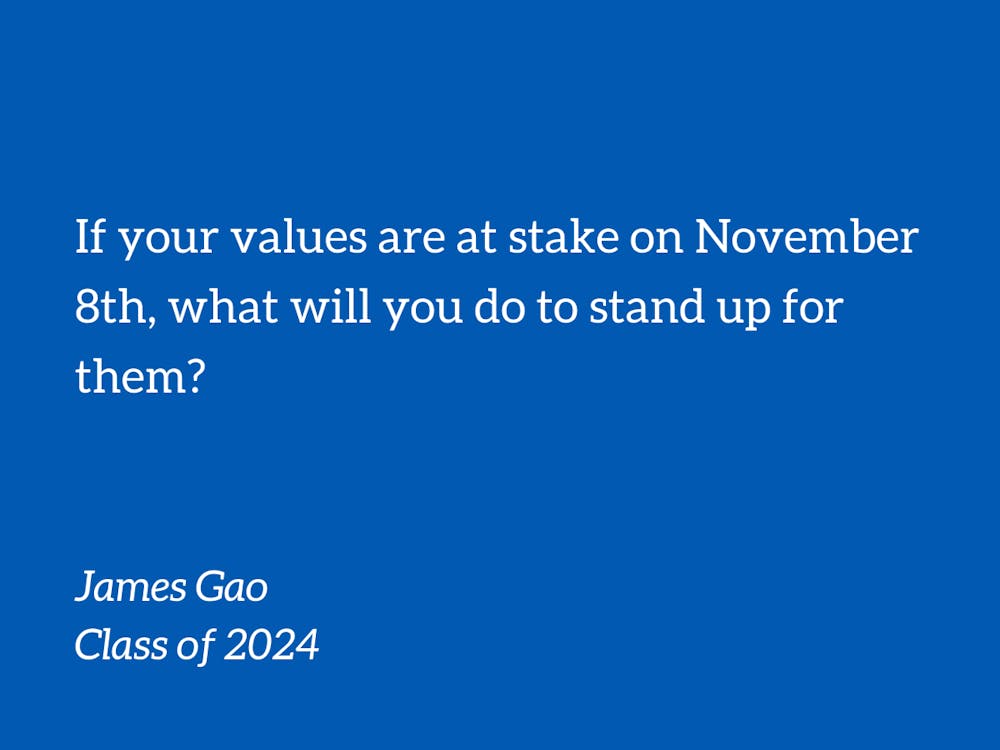Every two years, the “college turnout industrial complex” descends upon Duke. University administrators send out email blasts, encouraging students to exercise their constitutional rights. Third-party organizations invade BC Plaza, offering every freebie under the sun. Duke Votes ambassadors pervade the entire campus, lurking around every corner with clipboards, pens, and enthusiastic smiles.
Everyone is aware that midterm elections are coming up – our inboxes and social media feeds have made that certain. Everyone knows that they should vote—and that their vote matters. Many know who they’re voting for, and what issues are at stake. In this regard, some might proclaim that our campus is highly politically engaged. But what if our definition of “political engagement” is too loose?
It’s never been easier to “keep up” with politics. National media outlets allow us to stay abreast of both local elections and other races across the country. The comments sections of Instagram and TikTok make it easy to reinforce the views of the people with whom we agree and rebuke the views of those with whom we don’t. The enduring popularity of sites like FiveThirtyEight signals that our hunger for political information is at an all-time high.
In his 2020 book, Politics is for Power, Tufts University professor, Eitan Hersh, admonishes this exact behavior. He points out that while college-educated voters spend more time reading and debating about politics today than ever before, organizing and volunteering rates have plummeted. A practice once dominated by labor activism and civil rights organizing has been reduced to arguments in Fox News comments sections and intellectual debates among white-collar professionals. For many, politics has become an avenue for seeking affirmation and validation instead of a path to systemic change. Hersh terms this practice “political hobbyism” and argues that its rise is harmful to democracy. Instead, he contends, politics ought to be about “the methodical pursuit of power to influence how the government operates.” Politics is coalition-building. It is compromise. And, most importantly, it is sacrifice.
In 2022, youth voter participation is at an unprecedented level. More young people are informed and care about our elections than ever before. Yet opinion polls suggest that most people in our age bracket are unsatisfied with Biden’s performance, while the Republican Party seems poised to prioritize a policy agenda in opposition to young people’s stances on gun control, abortion, and climate change. Our generation remains locked out of formal political power. Yet if we continue engaging in politics purely as hobbyists, it is no wonder that we cannot channel our indignation into influence.
I see this worrying trend playing out on Duke’s campus. I have spent the last two months organizing for political candidates across North Carolina, and there have barely been any other students working alongside me. I get frustrated when I am bombarded by Instagram story after Instagram story championing the importance of abortion access or the dangers of anti-democratic extremism, but can hardly find students who are willing to fight for their beliefs. Granted, this work is often arduous, thankless, and unpleasant. But if building a path to institutional change were easy, we would have already done it. We must meet the moment, and channel our angst, our uncertainty, and our frustration into action.
In the few days that remain before these crucial midterm elections, I am challenging all of you to ask yourselves: are you an activist or a hobbyist? Do you truly engage with politics beyond reading and scrolling? And if your values are at stake on November 8th, what will you do to stand up for them?
James Gao is a Trinity junior. His column runs on alternate Fridays.
Get The Chronicle straight to your inbox
Sign up for our weekly newsletter. Cancel at any time.

